Patriot Ignite 480GB SSD Review
Why you can trust Tom's Hardware
Four-Corner Performance
Flash-based products pose more testing challenges than mechanical storage products. The workload you run before a test affects the results you see immediately after. In order to make true apples to apples comparisons, a strict benchmark regimen must be adhered to. With some products, the type of data used for testing, whether it's compressible or not, changes the performance story.
128KB Sequential Read Performance
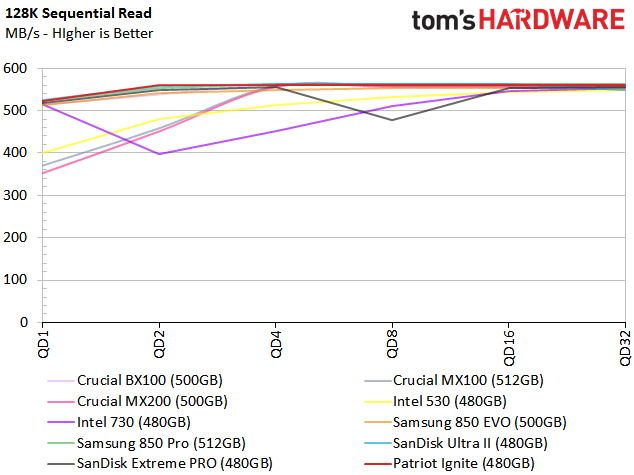
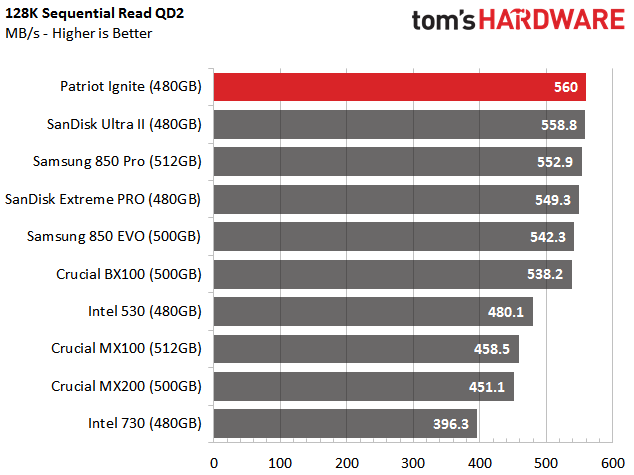
The Ignite 480GB starts out strong with the highest sequential read rating for this capacity and interface. The drive also performs really well across the queue depth range.
128KB Sequential Write Performance
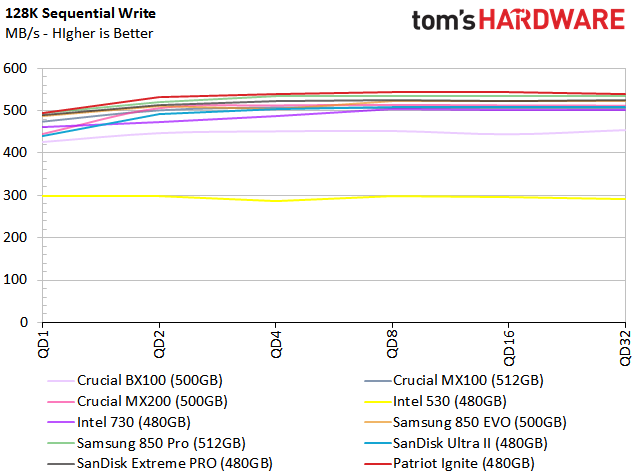
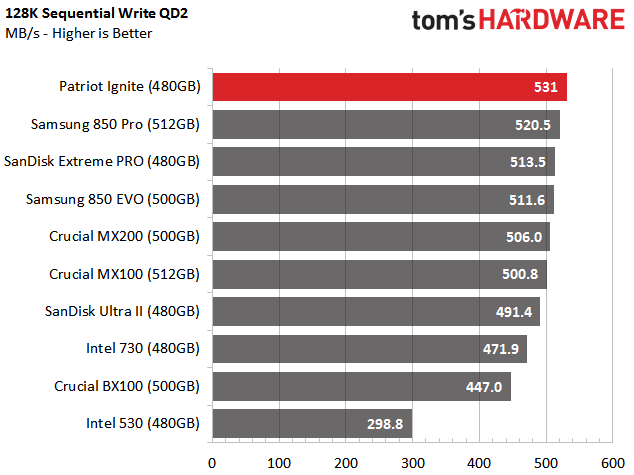
Sequential write speed is also impressive. Again, we show the Ignite 480GB at the top of the chart, outperforming premium products from Samsung and SanDisk.
4KB Random Read Performance
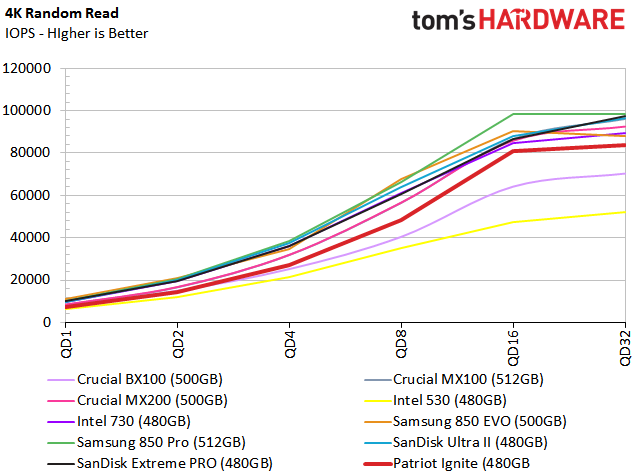
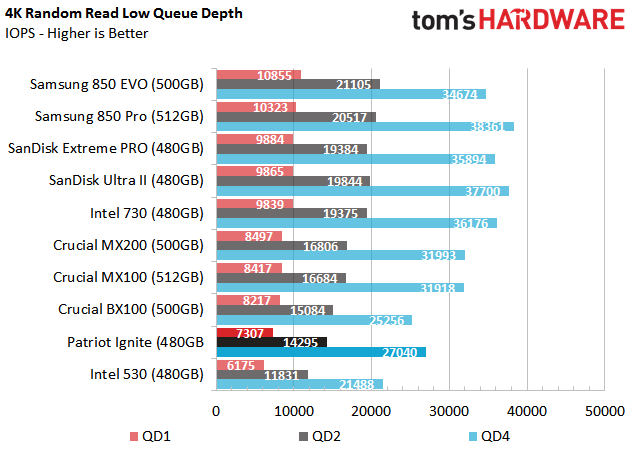
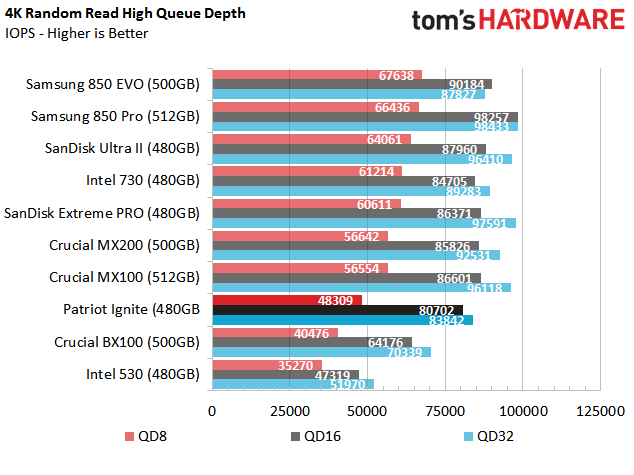
The Patriot drive loses momentum when we get into random performance. This is one of the areas Phison is working to improve, and we expect an update of some sort around mid May. Hopefully Patriot gets that out to end users.
4KB Random Write Performance
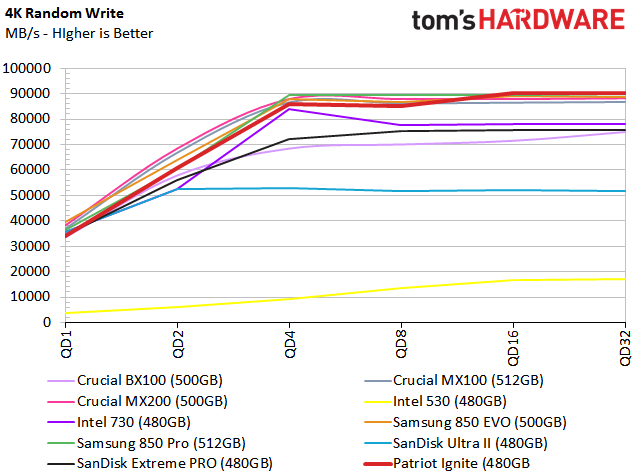
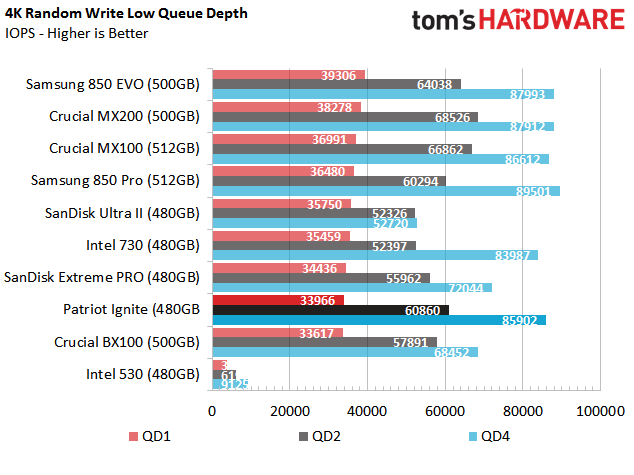
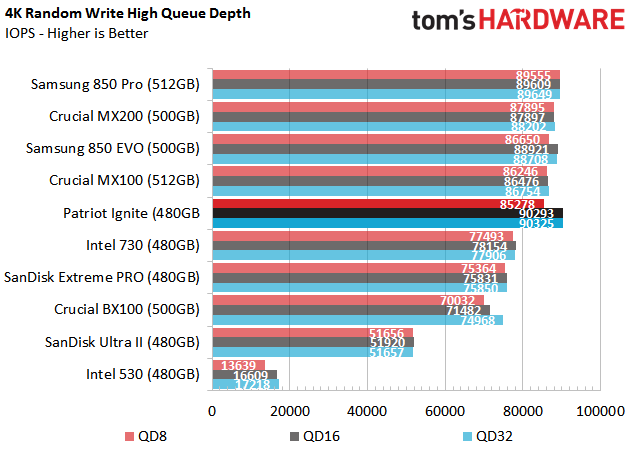
Random write performance after moderate preconditioning shows that the Ignite isn't far off from the higher-performance models at low queue depths. At a queue depth of 32, the Ignite actually outperforms the other drives. But in a desktop environment, high queue depths are few and far between.
Get Tom's Hardware's best news and in-depth reviews, straight to your inbox.
Current page: Four-Corner Performance
Prev Page A Closer Look at the Ignite 480GB Next Page Mixed Workload and Steady State Performance
Chris Ramseyer was a senior contributing editor for Tom's Hardware. He tested and reviewed consumer storage.
-
gnarr "A few tenths of a second in each service time benchmark might not seem like a lot, but over the course of a day, they add up. Admittedly, choosing one SSD over another won't double your productivity. Would you turn down an extra 10 or 20 minutes of getting stuff done, though?"Reply
Your reaction time is around 150-300ms, so having an SSD that is 200ms slower than the fastest SSD is not going to slow you down the least. It won't even give you 10 seconds of extra "getting stuff done" over a whole workday unless your work resolves around only opening and closing applications.
It might maybe save you 2-3 seconds when opening large Photoshop, After Effects, Premiere or Resolve projects, but as a video editor, I know you will most likely be working on the same project the entire day, and if you're opening many projects per day, they are usually rather small and thus will load in a blink of an eye. -
2Be_or_Not2Be @gnarr - I think the main point is being glossed over - if a SSD can finish a task x% slightly faster than another SSD/HDD, then it's allowing you x% more time to do *anything* on your computer. It doesn't matter if you went off to get coffee or if you were sitting there waiting on it to finish the task, your computer is now waiting on your input that x% faster. This has nothing to do with your reaction time or even opening files.Reply
During the course of a year, anything that allows you more time to do work on your computer makes you more efficient. -
damric How well does this controller respond to loss of power or hard reset?Reply
Too many SSDs on the market become bricked and unrecognized by the motherboard even after just a single loss of power.
I recommend reviewers do about 50 hard power-offs and see if the SSD survives. -
mf Red ReplyHow well does this controller respond to loss of power or hard reset?
Too many SSDs on the market become bricked and unrecognized by the motherboard even after just a single loss of power.
I recommend reviewers do about 50 hard power-offs and see if the SSD survives.
My R9 290x was causing hard power-offs when loading into games and my 840 Pro is still functioning just fine. I probably only did 20 hard resets though not 50 so maybe you're right. -
damric Reply15539409 said:How well does this controller respond to loss of power or hard reset?
Too many SSDs on the market become bricked and unrecognized by the motherboard even after just a single loss of power.
I recommend reviewers do about 50 hard power-offs and see if the SSD survives.
My R9 290x was causing hard power-offs when loading into games and my 840 Pro is still functioning just fine. I probably only did 20 hard resets though not 50 so maybe you're right.
The Samsungs usually don't have that problem, lucky for you. -
palladin9479 Reply15539409 said:How well does this controller respond to loss of power or hard reset?
Too many SSDs on the market become bricked and unrecognized by the motherboard even after just a single loss of power.
I recommend reviewers do about 50 hard power-offs and see if the SSD survives.
My R9 290x was causing hard power-offs when loading into games and my 840 Pro is still functioning just fine. I probably only did 20 hard resets though not 50 so maybe you're right.
The Samsung drives are of exceptionally high stability, almost enterprise level. I've never heard of one getting bricked by unexpected loss of power.
The thing to realize is that SSD's are basically a computer within a computer. Inside a SSD is a CPU, memory and an OS. When the drive powers on, it loads it's OS off the firmware which then goes about managing the flash cells and acting like a miniature SAN storage processor. From your computers point of view you only see a storage device, but that's being abstracted by the SSD's OS. You actually have between four to eight storage devices that are organized in a pseudo RAID configuration with the SSD's OS presenting it as a single device.
So unexpected loss of power will have the same effect on the SSD's OS as it does on your OS, corrupted data. Now modern OS's are written in such a way as to cope with potential data corruption caused by a random loss of power, but not all SSD's firmwares (OS's) are capable of doing that and thus the bricking occurs.
-
pilsner I really do not like it, but it seems that at this point in time, choosing a Samsung 850 Pro SSD is still the thing to do.Reply -
giantbucket Reply15536551 said:@gnarr - I think the main point is being glossed over - if a SSD can finish a task x% slightly faster than another SSD/HDD, then it's allowing you x% more time to do *anything* on your computer. It doesn't matter if you went off to get coffee or if you were sitting there waiting on it to finish the task, your computer is now waiting on your input that x% faster. This has nothing to do with your reaction time or even opening files.
During the course of a year, anything that allows you more time to do work on your computer makes you more efficient.
this would only be relevant if an SSD was just too darned slow and was holding you up, and YOU were waiting for IT to do something. 99.973% of the time, the SSD / computer is done while you're still thinking or you're distracted on the phone with a client or coworker. the gating item isn't the SSD, so the fact that it's 3% faster is irrelevant outside of a benchmark. -
2Be_or_Not2Be Reply15541542 said:15536551 said:@gnarr - I think the main point is being glossed over - if a SSD can finish a task x% slightly faster than another SSD/HDD, then it's allowing you x% more time to do *anything* on your computer. It doesn't matter if you went off to get coffee or if you were sitting there waiting on it to finish the task, your computer is now waiting on your input that x% faster. This has nothing to do with your reaction time or even opening files.
During the course of a year, anything that allows you more time to do work on your computer makes you more efficient.
this would only be relevant if an SSD was just too darned slow and was holding you up, and YOU were waiting for IT to do something. 99.973% of the time, the SSD / computer is done while you're still thinking or you're distracted on the phone with a client or coworker. the gating item isn't the SSD, so the fact that it's 3% faster is irrelevant outside of a benchmark.
No, what I'm saying is that if the SSD finishes x task faster, that in itself makes it more efficient. It doesn't matter if the end-user doesn't make use of the time after the SSD finishes the task; the SSD itself is more efficient.
If we try to say, "well, making something faster won't help the end-user because they're doing other things or reacting too slowly", then you almost might as well not try to make *anything* more efficient. That was the point of my responding to @gnarr - the end-user's reaction time doesn't really matter.
Thinking solely of the end-user directly using the SSD in his computer also doesn't include the consideration of SSDs being used by servers. Against, if a SSD performs faster (finishes x task even seconds faster), then that allows the next I/O request to be serviced even faster. All of that aggregated over time equals more performance & true efficiency gains, especially on a server that is heavily used.